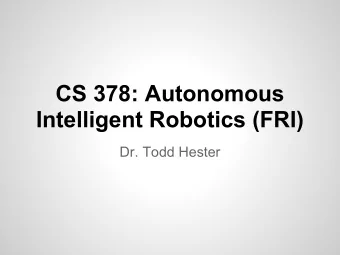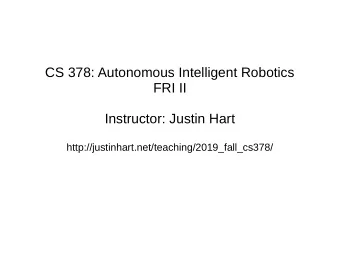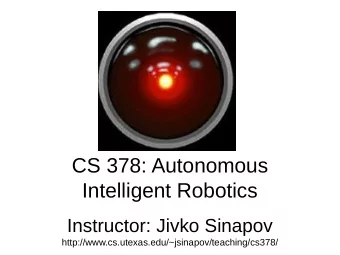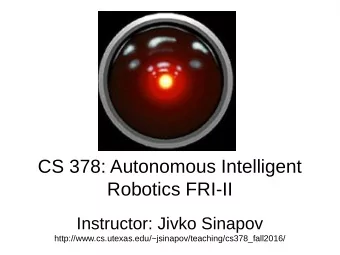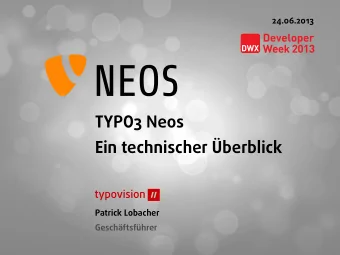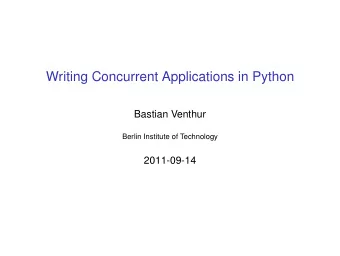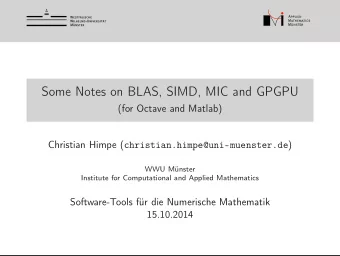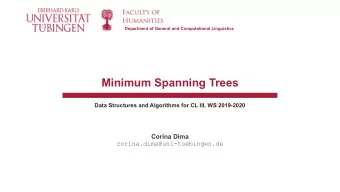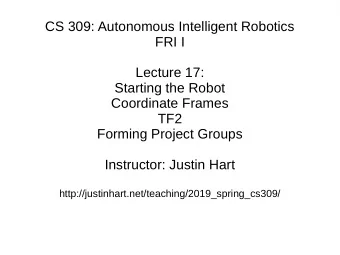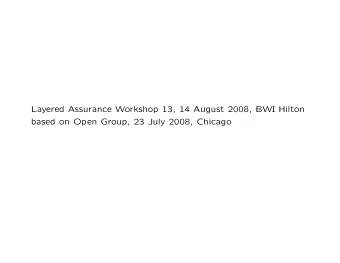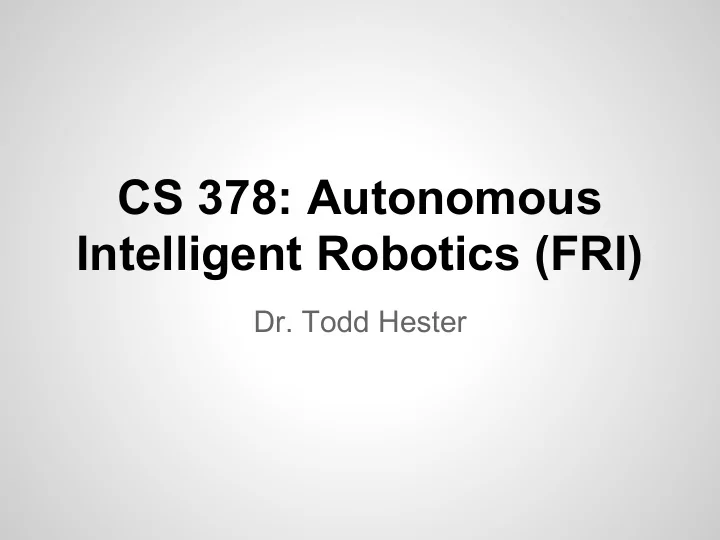
CS 378: Autonomous Intelligent Robotics (FRI) Dr. Todd Hester - PowerPoint PPT Presentation
CS 378: Autonomous Intelligent Robotics (FRI) Dr. Todd Hester Teaching Staff TA : Shweta Gulati Student Mentors: Josan Munoz Nick White Staff: Peter Stone Piyush Khandelwal Jack O'Quin Two Main Goals Learn about
CS 378: Autonomous Intelligent Robotics (FRI) Dr. Todd Hester
Teaching Staff TA : ● Shweta Gulati Student Mentors: ● Josan Munoz ● Nick White Staff: ● Peter Stone ● Piyush Khandelwal ● Jack O'Quin
Two Main Goals Learn about Autonomous Intelligent Robotics Learn about CS Research
Today ● Introduction to BWI Project ● Course Overview
Building Wide Intelligence (BWI) Create an intelligent environment inside the building using external components. 1) Persistent Robots 2) Display screens 3) Kiosks 4) Cameras 5) Rfid
BWI Robot
BWI Tasks/Goals ● Lead someone to their destination ● Track users in the building ● Bring things to people (video) ● Telepresence for meetings ● Others?
BWI Challenges ● Vision ○ Person detection, identification, and tracking ○ Identify landmarks ● Localization ○ Using vision, RFID, Wifi, Cameras ● Navigation ○ Navigate successfully to a destination ● Motion ○ Motion planning, obstacle avoidance, safety ● Human Robot Interaction ○ Natural Language ○ Multiple robot - Single intelligent entity? ● Multi-Robot Planning/Coordination
BWI Project ● Segway Robots ● Cameras ● RFID Tags ● AR Drone Copter ● Existing codebase for some things ● Using Robot Operating System (ROS)
Open Ended Research You will have freedom to work on any aspect of the project you want. But it will require hard work.
About this course ● This is a unique opportunity for undergraduates at the freshman level to engage in research. There are opportunities to possibly publish papers, do undergraduate theses, etc. ● This semester is split into an introduction to the BWI project and then a small research project. In the fall, you will solely work on independent research projects. ● There are no prerequisites. However this research stream requires some programming skills. So you'll need to work on those over the Spring semester.
Course Design ● Introduction ○ Readings and Programming Assignments ● Research Projects ○ Open-ended readings ○ Finding research papers ○ Weekly updates on research progress
Course Overview Syllabus
Workload Summary ● Each week ○ 1 Reading + summary ○ Find 1 new paper ○ Week 7 on... project update ● 2 Programming Assignments ● Class participation Research Project ● Project updates each week ● Project proposal ● Progress report ● Final report
Research ● Freedom to work on what you want ● Developing new and innovative ideas Hard work ● Self-motivation (no hand holding) ● Open-endedness ● Programming Skills
Programming ● If you know Java but not C++ ○ Pattern match off existing code ○ A ton of C++ tutorials online - I'll point you to these ○ Lots of office hours ● If you don't know programming ○ We don't have the time to go through a lot of basic programming concepts in class ○ However, we have a number of people to help you with programming outside the lecture hours ○ You can also try enrolling in a programming course this semester itself. ○ Learning programming will require quite a bit of self-effort, but as long as you try you'll be fine.
Expected of you ● Ask questions ○ You have a problem, let us know. Follow it up! ● Expand your knowledge ○ For instance, if we give you a list of commands to run: look up what they do! ● Search for solutions on the internet ○ If you have a problem, someone else has probably had it in the past as well. ● A serious effort to learn and improve programming skills ● Working on your own time ●
This week ● Make sure you have a CS account. ○ https://udb.cs.utexas.edu/amut/acut/ ● Make sure you have a wiki account (can edit a page) ○ http://zweb.cs.utexas.edu/users/piyushk/bwi/index. php/CS378/Main_Page ● Enroll in Piazza ○ www.piazza.com
Next week ● Reading Assignment 1 (due Monday 9 PM) on class webpage: ○ http://www.cs.utexas.edu/~todd/cs378/#table ● Add a paper to the wiki (due Tuesday 12:30 PM)
How to read a paper ● Pass 1 ○ Read abstract, introduction and results/conclusion ○ Figure out what paper is about ○ Don't dive into the paper without getting the overall idea! ● Pass 2 (Required for understanding) ○ Read the paper in depth ○ Be critical and inquisitive ○ Jot down notes/questions on the margins - mark everything you did not understand ○ These points will help you discuss the paper ○ Not necessary to understand all technical details
How to find a paper ● Google Scholar ● Look at citations of other relevant papers ● Look up similar projects and check out their publications pages
Recommend
More recommend
Explore More Topics
Stay informed with curated content and fresh updates.
